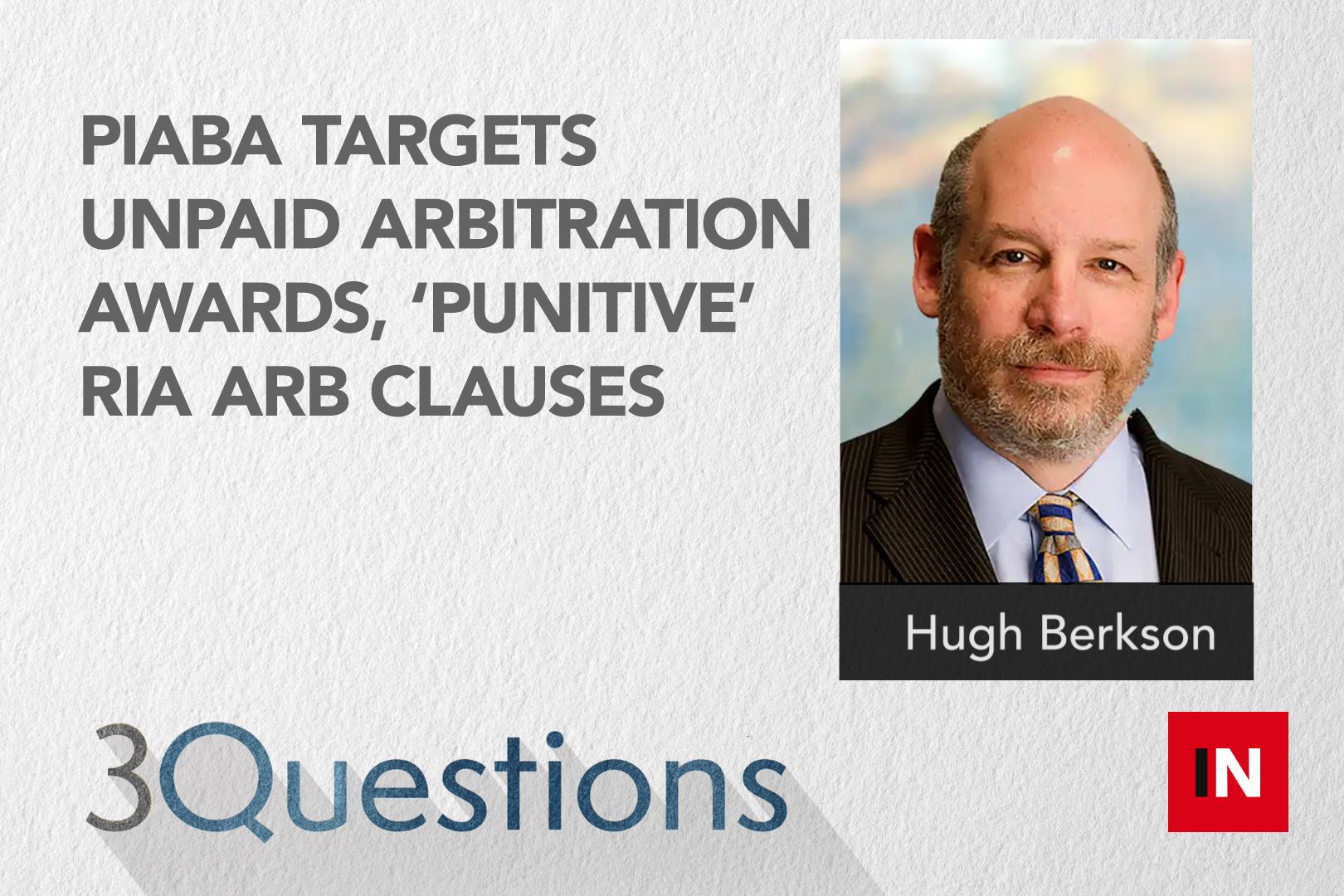Gensler’s SEC puts the focus back on investor protection
In Chairman Gary Gensler’s first six months, the SEC has tackled topics including Reg BI and online brokerages’ digital engagement practices, signaling the regulator is refocusing on investor protection, says Kurt Schacht of the CFA Institute.
Mark Scheff Jr. [00:00:03] Welcome to Three Questions, I’m Mark Schoeff Jr., senior reporter for InvestmentNews. Today we’re joined by Kurt Schacht head of policy advacacy at the CFA Institute. Like me, Kurt is based in Washington. He represents the CFA Institute as it tries to shape legislation and regulations affecting financial advisers who hold the Chartered Financial Analyst Credential. Kurt is, also the former chairman of the SEC Investor Advisory Committee. Thank you for joining us, Kurt.
Kurt Schacht [00:00:36] Thank you, Mark. Nice to see you again. Thank you.
Mark Scheff Jr. [00:00:38] Yes. How would you evaluate SEC Chairman Gary Gensler first six months in office?
Kurt Schacht [00:00:44] It’s been a it’s been really interesting to watch. It’s it’s quite a contrast from from the last commission. It is an absolute policy juggernaut. I guess I would call it at least the list of initiatives is quite remarkable. And you know, from the standpoint of CFA Institute, which is really focused on investor protection, this feels like a legit refocusing on the things that matter to investor protection, and we’re very excited about that. So despite claims, I think by the last commission about to the contrary, I think investor protection went a little bit wanting, at least at least on a number of things. And so we’re we’re sort of excited to see Gensler’s announcements about fixing some of the things that we of think kind of got out of whack from investor protection standpoint last time. So I would I would put in that category the ill conceived proxy advisor rules that were there out there. And now currently, I think it’s in suspension. We think there was a real missed opportunity on reg BI and a number of mistakes with respect to the reg BI regulation, which is now again going to be reassessed. And we clearly had a fairly dysfunctional PCAOB and their inability to really integrate the investor in the investor and user input into that process. And so we’re glad to see that sort of fix a lot of new things on his agenda with the digital engagement practices. We have the GameStop issue and of the issues about about how these firms are engaging with their with their new brokerage, customers may be testing the limits of reg BI and what is advice and so forth. We have the crypto markets and products, the securities law implications for those. We have the new SPAC phenomenon, which you and I talked about before. And then there’s quite a bit of a work in terms of the guidance for corporate rules around reporting on ESG issues, sustainability reporting issues, huge list of new things. And then there’s some, even some lingering things from the old Dodd-Frank days. I mean, we’re, you know, a decade passed Dodd-Frank, but we’re still, you know, we have a bit of unfinished business with money market mutual funds and some of the issues around swaps and central clearing counterparties and so forth. So it’s been it’s got a wonderful list. It’s really ambitious, probably pretty difficult to get through that and to the finish line on all of it. But I think it does signal a new era where investor protection is sort of back in focus.
Mark Scheff Jr. [00:03:24] One of the issues that’s at the top of Chairman’s Gensler Chairman Gensler is list, of course, is environmental, social and governance investing. The SEC is doing its part in a government wide Biden administration push to tackle climate change and what the Biden administration says is the systemic risk in the financial markets posed by climate change. How will increased ESG regulation and oversight by the SEC most directly affect financial advisers?
Kurt Schacht [00:04:01] It’s yet to be seen what the SEC is actually going to do on two fronts. First of all, what they may be requiring in terms of the investment managers duty to integrate ESG factors into the investment decision making process. But I think even more importantly, and maybe a prerequisite to requiring mandatory integration, is that we have to figure out the rules and the consistency of what corporations are reporting on sustainability matters. So if you’re going to make investors factor it in, there ought to be a more standardized approach to the kind of information that we’re getting from corporates. Those two things have to kind of happen. Our group just recently did a survey and our our membership are user professional investor membership does not like the idea of the government mandating what a professional investor has to integrate into its investment decision making process. There is a, you know, there is a feeling that as a professional and dealing as a fiduciary with your customer, it’s between those two parties to decide what you know, what sort of focus they want to put on ESG factors in that in that particular product. Number one, and so don’t mandate it. Certainly, you know, we’re interested in considering what we think is material information to the investment management decision. But maybe a bigger concern from us in terms of an investor protection issue is the issue of greenwashing. And that is where there’s a lot of products that have stamped the ESG brand on their product. And the question is whether that is there’s truth in marketing, whether they’re actually doing an ESG strategy, and we’d like to see a more consistent requirement for ESG product sales in terms of how they disclose their product, what you know, how do they actually verify that they’re doing what they’re saying, they’re doing with respect to ESG and effects, CFA Institute is just in the process of completing a set of performance marketing disclosure standards on this particular topic. We think it’s something that the industry could use, and it would be a consistent way for those claiming to have an ESG strategy to to to report what they’re doing. So, so again, I think, you know, it remains to be seen what the SEC is going to do on sustainability reporting for corporates and what they’re going to do in terms of the requirements for the investment management community. But we’re we’re watching it very closely, as you might expect.
Mark Scheff Jr. [00:06:27] Yes, Kurt. Earlier you mentioned SPACs special purpose acquisition companies. This was a hot area of of investment earlier in the year. It’s called perhaps a little bit, but it investor protection surrounding SPACs is something certainly the SEC has its eye on you and I spoke for a recent article I did on a FINRA exam sweep on SPACs. And you told me that CFA Institute is has established a task force on SPAC policy. What would the CFA Institute like to see in terms of SPAC regulation?
Kurt Schacht [00:07:06] Thank you. Thanks for that question mark, and we have created this SPAC working group to look specifically at those issues. I don’t think we’ve come to any real conclusions yet as to what might be missing in the marketplace in terms of regulation for these things, they are IPOs, much like the IPO bubble that we had back in 2000, the dot com era. We’re concerned that we not get overheated to the point. Obviously, IPOs proliferate during market tops. This is just a bit of a different structure of an IPO. And the question is, is it different enough? Is it perpetuating different kinds of outcomes for investors? Were selling SPACs, as with, you know, with celebrity sponsors. We don’t really have a whole lot of rules and regulations around all of the social media chatter associated with these kinds of offerings. And it’s been it’s being essentially marketed as a a private equity strategy for the retail investor. And we just want to make sure that we look at those issues, whether there’s any disclosure matters that that really need to be much more prominent and much more detailed in terms of what what these products are like. Yeah, I think you and I talked about the way the way professional investors invest in private equity is. They have a very diversified set of managers and portfolio companies and sort of a one and done. You’re going to find the right private equity investment through the SPAC structure for the retail investor is a pretty daunting prospect. And we just want to make sure it’s not that investor shouldn’t have a chance to invest in these, that we don’t have a free market, but I think we just have to be honest about what we’re selling to the public, right?
Mark Scheff Jr. [00:08:46] Right, well, we’ll be following CFA Institute’s work on on specs as well as the other range of issues that you cover. Kurt, thank you for taking time to talk with us today.
Kurt Schacht [00:08:57] My pleasure, Mark. Thanks.



